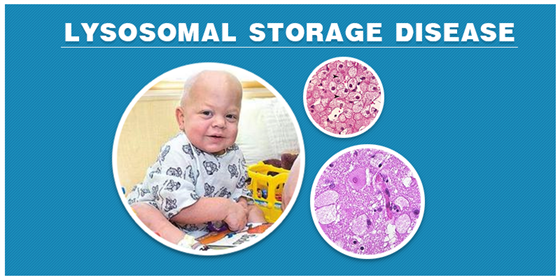Table of Contents
Introduction
Lysosomes
Lysosome and Suicidal Bags
Lysosomal Storage Diseases
Types
Symptoms
Causes
Diagnosis
Treatment
Introduction
A disease which is caused by the lack of enzymes in the Lysosomes of a cell is called as a Lysosomal storage disease. The enzyme present in the lysosomes play an important role in eliminating all unwanted substances present in a cell of the human body.
What are Lysosomes?
Lysosomes are defined as subcellular, spherical organelles, consisting of hydrolytic enzymes. The main function of Lysosomes is to protect the cell from being digested as it surrounds the cell membrane. It also helps in smooth digestion by converting the food particles into a simpler form by breaking them into minute particles. This organelle is also called digestive bags or suicidal bags.

Why are Lysosomes called Suicidal bags?
Lysosomes are known as suicidal bags as it is involved in the renewal of cells, removal of dead cells and breaking down the old cells. It protects the cell from engulfing the disease-causing or harmful microorganisms including protozoa, fungi, bacteria, and viruses. It is also involved in the ingestion of dead cells along with other invading microbes.
Lysosomal Storage Diseases
Lysosomal storage diseases are metabolic disorders, which are characterized by an accumulation of macromolecules. These macromolecules include toxic materials, undigested particles of the cell, etc. These macromolecules get piled up because of the lack of enzymes in the Lysosome. These disorders can affect many parts of the body including the circulatory system, the central nervous system, digestive system, skin, liver, eyes, bones, spleen, kidneys, etc. There are more than 50 different types of Lysosomal storage diseases. This disorder affects one in 7,700 births.
Different Types Of Lysosomal Storage Diseases
Gaucher disease, Fabry disease, Niemann-Pick disease, Pompe disease and Tay-Sachs disease are few names of Lysosomal storage diseases.
Symptoms Of Lysosomal Storage Diseases
The symptoms of this disorder are organ enlargement including heart, spleen, and liver.
Other symptoms include
- Skin Rashes
- Burning pains in hand and feet
- Lung dysfunction
- Damage to Central Nervous System
- Muscle weakness
- Heart failure in infants
- Mental and physical deterioration
- Respiratory problems
- Kidney failure
- Pain and numbness found in hand and feet
- Anemia
- Stiff limbs and unable to walk
- Tiredness
- Depression
- Heart failure followed by strokes and death at an early age.
Causes Of Lysosomal Storage Diseases
The main cause of Lysosomal storage diseases are:
- The lack of enzymes in the Lysosome.
The enzymes present in the Lysosomes helps in digesting food particles, dead cells, old cells and engulfing disease-causing microorganisms including protozoa, fungi, bacteria also viruses. It is also involved in the ingestion of dead cells along with other invading microbes.
- Deficiency of proteins in our body also results in Lysosomal storage diseases as it plays a vital role in modification of enzymes in Lysosome.
- Most of the Lysosomal storage diseases are inherited in an autosomal recessive manner.
Diagnosis Of Lysosomal Storage Diseases
It is quite difficult to diagnose this disorder as the symptoms vary from one type to another type of Lysosomal Storage Disorders. There are a few diagnoses carried out in a specialized laboratory. Tissue biopsies are also used for diagnosis of Lysosomal Storage Disorder in the patient by analyzing the sample of tissue or cells collected from the patient’s body for analysis. Skin fibroblasts test, blood test, amniotic fluid test and urine test are also used for testing the presence of this syndrome in a patient’s samples.
Treatment Of Lysosomal Storage Diseases
Presently there are no such treatments or cure available for Lysosomal Storage Disorder. Research is still in process. Scientists are not able to find the exact cure as there are around 50 to 60 different types of Lysosomal Storage Disorder with different symptoms. There are few therapies which are carried out to treat these diseases. This therapy includes transplantation of bone marrow, replacement of enzyme and substrate reduction therapy.
Stay tuned with BYJU’S to know more about the Lysosomal Storage Diseases.

Comments